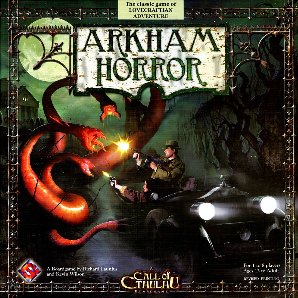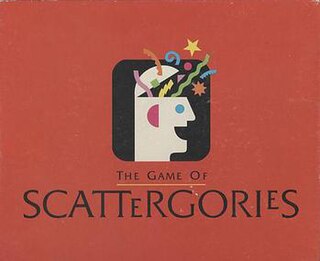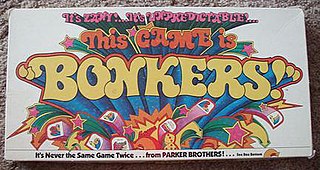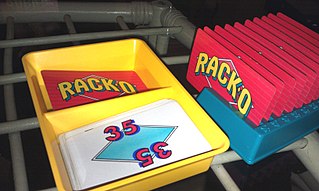Related Research Articles

Monopoly is a multi-player economics-themed board game. In the game, players roll two dice to move around the game board, buying and trading properties and developing them with houses and hotels. Players collect rent from their opponents, aiming to drive them into bankruptcy. Money can also be gained or lost through Chance and Community Chest cards and tax squares. Players receive a stipend every time they pass "Go" and can end up in jail, from which they cannot move until they have met one of three conditions. House rules, hundreds of different editions, many spin-offs, and related media exist. Monopoly has become a part of international popular culture, having been licensed locally in more than 103 countries and printed in more than 37 languages. As of 2015, it was estimated that the game had sold 275 million copies worldwide.

Candy Land is a simple racing board game published by Hasbro. The game requires no reading and minimal counting skills, making it suitable for young children. No strategy is involved as players are never required to make choices; only following directions is required. About one million copies per year are sold.

Sorry! is a board game that is based on the ancient Indian cross and circle game Pachisi. Players move their three or four pieces around the board, attempting to get all of their pieces "home" before any other player. Originally manufactured by W.H. Storey & Co in England and now by Hasbro, Sorry! is marketed for two to four players, ages 6 and up. The game title comes from the many ways in which a player can negate the progress of another, while issuing an apologetic "Sorry!"

Howard Roger Garis was an American author, best known for a series of books that featured the character of Uncle Wiggily Longears, an engaging elderly rabbit. Many of his books were illustrated by Lansing Campbell. Garis and his wife, Lilian Garis, were possibly the most prolific children's authors of the early 20th century.
Uncle Wiggily Longears is the main character of a series of children's stories by American author Howard R. Garis. He began writing the stories for the Newark News in 1910. Garis penned an Uncle Wiggily story every day for more than 52 years, and published 79 books in his lifetime. According to his obituary in the Chicago Tribune, a walk in the woods in Verona, New Jersey was his inspiration. The books featured work by several illustrators, notably Lansing Campbell. Other illustrators of the series included George L. Carlson, Louis Wisa, Elmer Rache, Edward Bloomfield, Lang Campbell, and Mary and Wallace Stover.

The Yu Yu Hakusho Trading Card Game was first published in 2003 by Score Entertainment, and is based on the anime and manga series YuYu Hakusho. It is a two-player tournament-styled collectible card game; each player uses a deck of forty-four or more cards that is headed by a team of four character cards. The game was discontinued in 2005.

Arkham Horror is a cooperative adventure board game designed by Richard Launius, originally published in 1987 by Chaosium. The game is based on Chaosium's roleplaying game Call of Cthulhu, which is set in the Cthulhu mythos of H.P. Lovecraft and other horror writers. The game's second edition was released by Fantasy Flight Games in 2005, with a third edition in 2018.

Scattergories is a creative-thinking category-based party game originally published by Parker Brothers in 1988. Parker Brothers was purchased by Hasbro a few years later, which published the game internationally under its Milton Bradley brand. The objective of the 2-to-6-player game is to score points by uniquely naming objects within a set of categories, given an initial letter, within a time limit. The game is based on a traditional game called "Categories".

Bonkers! is a race-style board game designed by Paul J. Gruen and produced first by Parker Brothers, later by Milton Bradley, and briefly reissued by Winning Moves. The object is to be the first player to score 12 points by adding instruction cards to the empty spaces in an attempt to move to several scoring stations. The game's slogan is "It's Never the Same Game Twice!"

Rack-O is a Milton Bradley sequential-matching card game with the objective of obtaining 10 numbers, in numerical order, in one's hand. Score may be kept on a separate piece of paper, based upon either a custom system or the system provided in the rule book. Rack-O allows between 2-4 players, and is recommended for players age 8 and up. Rack-O was released in 1956 and is currently being produced by Winning Moves Games USA.
I'm the Boss! is a board game by American designer Sid Sackson. It is a negotiation game in which a group of players compete and cooperate to put together profitable business deals. The goal is to make the most money. I'm the Boss is currently published by Gryphon Games, after the Face2Face Games edition. It was previously published as Kohle, Kies & Knete.
Which Witch? is a children's board game published in 1970 by the Milton Bradley Company, and was invented by Joseph M. Burck of Marvin Glass and Associates. The board represents a haunted house with four large rooms: the Broom Room, the Witchin' Kitchen, the Spell Cell and the Bat's Ballroom, assembled before play into a three-dimensional model house with vertical walls, and a large plastic chimney in the center. There are four tokens, colored red, yellow, blue and green. Each token is shaped like a child, either a boy or a girl, with four corresponding mouse tokens of identical color.
Easy Money was a board game introduced by Milton Bradley Company in 1935. Like Monopoly, the game is based on The Landlord's Game in the movement of pieces around the board, the use of cards, properties that can be purchased, and houses that can be established on them.
13 Dead End Drive is a murder-themed board game originally released by Milton Bradley in 1993. It was followed in 2002 by a spinoff, 1313 Dead End Drive. Currently, Winning Moves Games USA publishes the game in the USA.

Mall Madness is a shopping themed board game released by Milton Bradley. The original game was released in 1988 and an electronic talking version was sold starting in 1989. Milton Bradley updated the game with a new design in 1996 and an additional updated version was released in 2004. A redesigned version was released in 2020.
The Sergeant Preston Game is a Milton Bradley Company board game copyright dated 1956, and based on the television program, Sergeant Preston of the Yukon (1955–1958) starring Richard "Dick" Simmons.

Last Night on Earth: The Zombie Game is a survival horror board game that was first published in 2007. Players can play on the Hero team or as the Zombies. A modular board randomly determines the layout of the town at the start of each game and there are several different scenarios to play. Seven supplements have been released.

Monopoly: The Mega Edition is a special variant of the popular board game Monopoly. The game was first published in 2006 by Winning Moves Games USA in the USA. A UK version was adapted in 2007.

RoboRally is a board game for 2–8 players designed by Richard Garfield and published by Wizards of the Coast (WotC) in 1994. Various expansions and revisions have been published by both WotC and by Avalon Hill.
The fictional universe of the Discworld novels by Terry Pratchett features a number of invented games, some of which have gone on to spawn real-world variants.
References
- ↑ Francis, Judy. "Historical treasure: Uncle Wiggily evolves from books to board game". Terre Haute Tribune-Star. Retrieved 17 September 2022.
- ↑ Palladino, Valentina (22 August 2019). "Staffsource: Ars staffers reminisce on the games that made them gamers". Ars Technica. Retrieved 17 September 2022.
- ↑ "Uncle Wiggily". BoardGameGeek. Retrieved 2008-05-04.
- ↑ Waggoner, Susan. Under the Tree: the Toys and Treats That Made Christmas Special, 1930-1970. Stewart, Tabori & Chang, 2007.